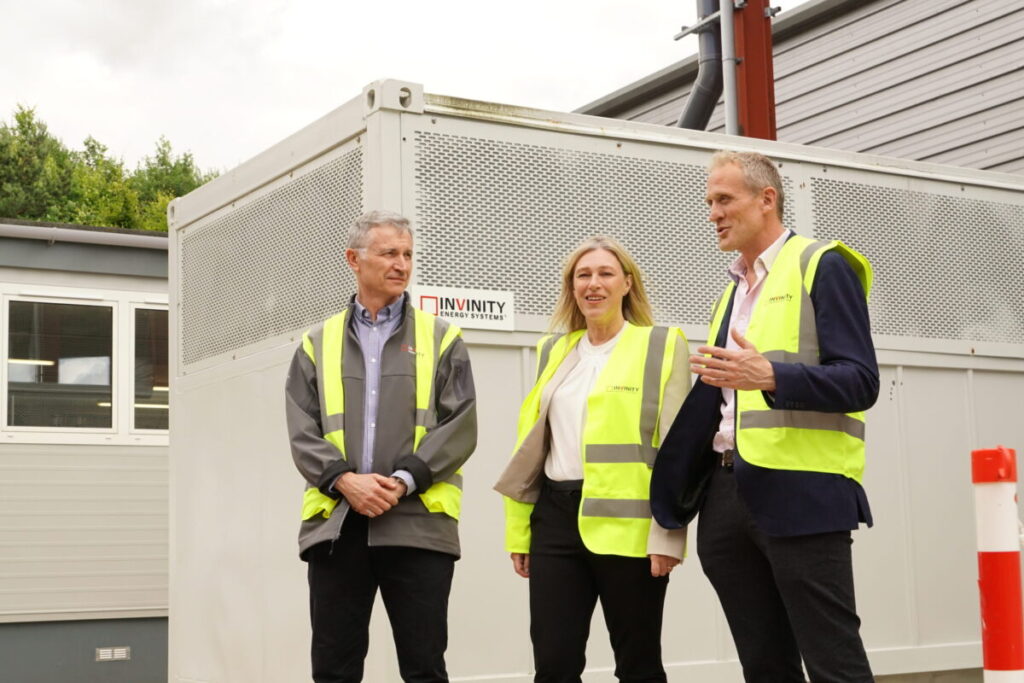
Invinity Energy Systems, a technology company that develops vanadium redox flow batteries (VRFB), plans to expand its manufacturing footprint in Scotland, UK.
The London Stock Exchange-listed company announced earlier this week (3 June) that it has leased a 26,000-square-foot site in Motherwell in the North Lanarkshire region bordering Glasgow.
Enjoy 12 months of exclusive analysis
- Regular insight and analysis of the industry’s biggest developments
- In-depth interviews with the industry’s leading figures
- Annual digital subscription to the PV Tech Power journal
- Discounts on Solar Media’s portfolio of events, in-person and virtual
It follows the successful raise of £57.38 million (US$73.29 million) financing by Invinity, which was completed on 24 May, and the new plant will be accompanied by an expansion to its existing facility in Bathgate, in the nearby West Lothian council area of Scotland.
Together, the new Motherwell plant, which will focus on assembly of VRFBs, and Bathgate, at which the batteries’ cell stacks are manufactured, will bring Invinity Energy System’s VRFB annual manufacturing capacity in the UK to more than 500MWh, the company claimed.
The new factory is expected to come online in the third quarter of this year, and Invinity said it would assist in delivering products to customer projects in its near-term pipeline.
Invinity is perhaps one of the furthest advanced flow battery companies in terms of commercialisation. It is thought to be the only flow battery technology company included in the first edition of BloombergNEF’s Tier 1 list of global energy storage system (ESS) providers launched at the start of this year, while its projects include some of the biggest of its type worldwide outside China.
Those include Canada’s biggest solar PV-plus-flow battery project so far, at Chappice Lake in Alberta, commissioned in 2023, and Australia’s first utility-scale VRFB project, in rural Yadlamalka, South Australia, currently under construction.
Semi-automated lines to reduce unit production costs, Invinity says
Invinity was formed through the 2020 merger of two existing flow battery companies, Canada’s Avalon Battery and UK-headquartered redT.
It completed an expansion of its Vancouver, Canada, manufacturing facility to 200MWh of annual capacity in June 2023, and in March this year Invinity VP of business development Matthew Walz told Energy-Storage.news that some of the US projects it is negotiating with customers include some that are over 100MWh capacity each. Invinity sold around 31MWh of flow batteries in 2023.
Invinity said this week that upgrades to the Bathgate facility will include the implementation of semi-automated production lines which along with boosting manufacturing capacity will allow the company to reduce unit costs of production.
Meanwhile, when announcing its now-completed fundraise earlier this year, the company’s CCO Matt Harper told Energy-Storage.news Invinity would directly invest around £23 million into large-scale flow battery projects in the UK from the funding.
Reducing costs, largely through increasing scale and automation of production, and evolving business models through strategies, such as direct investment in or ownership of downstream projects, could both be important pathways to successfully commercialising long-duration and non-lithium energy storage technologies such as flow batteries.






